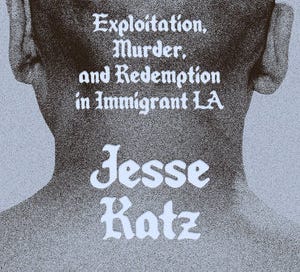In The Rent Collectors: Exploitation, Murder, and Redemption in Immigrant LA, Jesse Katz details the saga of one 18th street gang member, shares the ways street vendors are criminalized, and spells out the various ways prisons are big business in the United States and specifically, California. The Rent Collectors is at turns dizzying and exhausting when Katz describes the inevitable ways some MacArthur Park stalwarts become entwined with the Columbia Lil Cycos gang in a way that can only be described as being in the wrong place at the wrong time. The normalized violence, poverty, and crime that people in the gang’s orbit endure, benefit from, and suffer from all at once is a maddening cycle of exploitation that most of the people mentioned in The Rent Collectors don’t survive or don’t thrive in due to trauma even when they are able to escape the confines of MacArthur Park.
When I first opened the book, I was intimidated by the organization chart that introduces part one. It lists a hierarchy of aliases for rent collectors, soldiers, lieutenants, shotcallers, a lawyer, and the godfather sitting at the top. Reading it now that I’ve read The Rent Collectors it is intriguing to see the names of people who became more than two dimensional “thugs” or “gangsters” — to see the names of those who redeemed themselves to some extent, and the ones whose minds were so manipulated by the promise of belonging and their strict adherence to a warped values system that I would say are irredeemable. That’s not to say time in prison is a just solution to the two botched murders Katz details. Throughout The Rent Collectors, it is intriguing to be reminded that the Columbia Lil Cycos were just small scale capitalists, the self-instituted MacArthur Park taxation authority overseeing a thriving economy of goods and services. Illicit goods and services, yes, but capitalist nonetheless. To be a vendor in MacArthur Park, most likely undocumented and caught between harassment from the Columbia Lil Cycos and the LAPD, “you have to lose your embarrassment. With embarrassment, you’re not going to eat,” as one vendor described as the sock queen of Alvarado puts it. The Rampart Division of the LAPD which oversees MacArthur Park is one with a particularly violent history and what Katz describes as a “cabal” of rogue cops. I would argue that the so-called Fort Apache cops operated as a gang themselves. This is the environment in which Giovanni Macedo, aka Rusty is born, raised, and hellbent on belonging in — until he botches a murder and kills a newborn baby.
A difficult read in the sense that any account of attempted murder and trauma is, there is so much pathos permeating throughout The Rent Collectors that really felt grounded and connected to the people being described. Especially when thinking of people like Shorty, Midget, Reyna Flores, Francisco Clemente, and of course, the painfully naive Giovanni. An especially poignant moment is when Reyna is sharing advice her uncle gives her about managing a specific parental sorrow, he gives her a mantra to speak for no one to actually hear: I love you. I forgive you. I free you. I bless you. And I wish you the best. It is an unexpected moment of family tenderness perfectly included for another tender moment between Reyna and her son Giovanni. It is also a painful reminder of the newborn child Giovanni accidentally murders, and how that child and his mother will never share a moment like this. There are so many scenes in The Rent Collectors that stand out as reminders that there are people willing to look out for you, regardless of your disparate lives. Like when Giovanni is helped by gas station clerks in Mexico, or the lengths an LAPD official goes to secure green cards for two people. These moments are spread out enough to lighten all the heavy facts and psychic and physical wounds shared throughout. The Rent Collectors ends with some things unfinished, but I think Giovanni is on his way to reach the redemption alluded to in the title.
I read this book by receiving an ARC from Astra Publishing House. Thank you to Astra Publishing House. You can pre-order The Rent Collectors: Exploitation, Murder, and Redemption in Immigrant LA here.
The title of this essay was taken from a Diamanda Galás cover of a Johnny Paycheck song. Mona of WFMU recently interviewed Galás on her radio show. Check it out here.
For more information on gangs in uniform, specifically in the Los Angeles Sheriff’s Department check out Cerise Castle’s investigative series, A Tradition of Violence, here.





